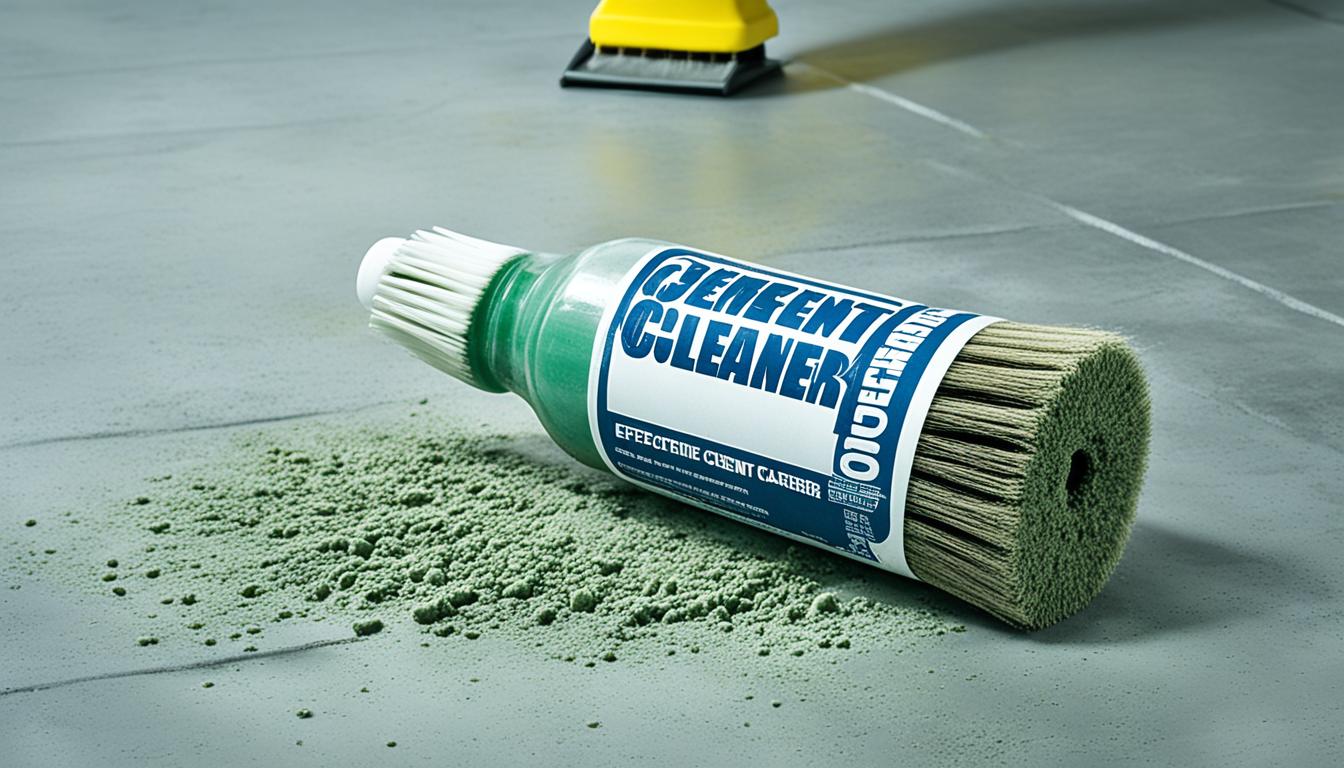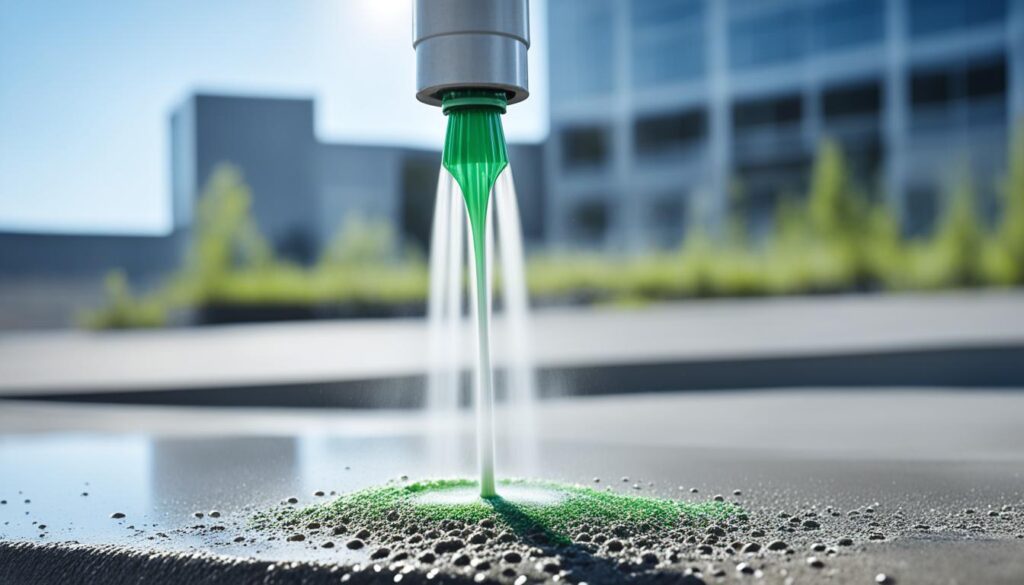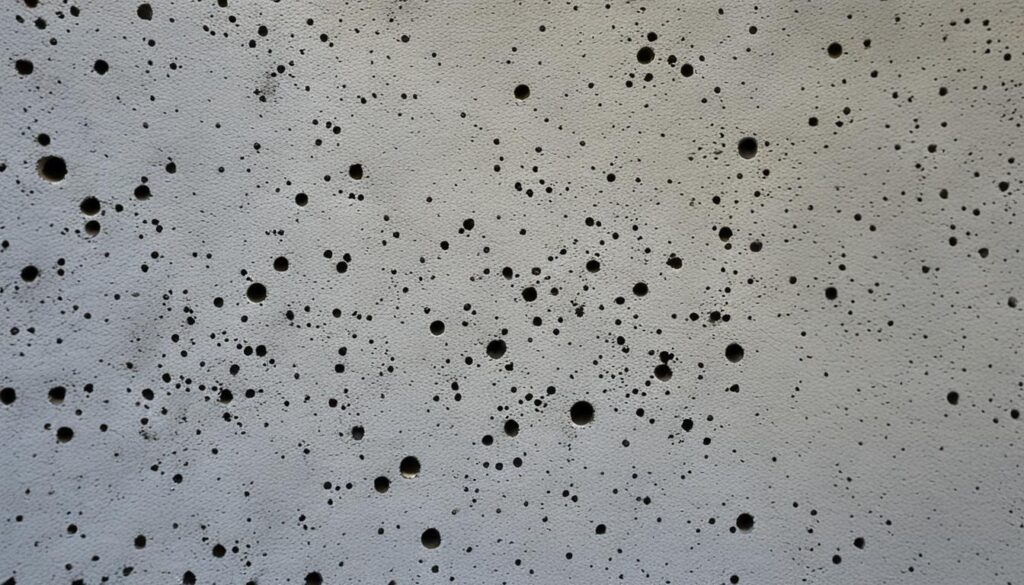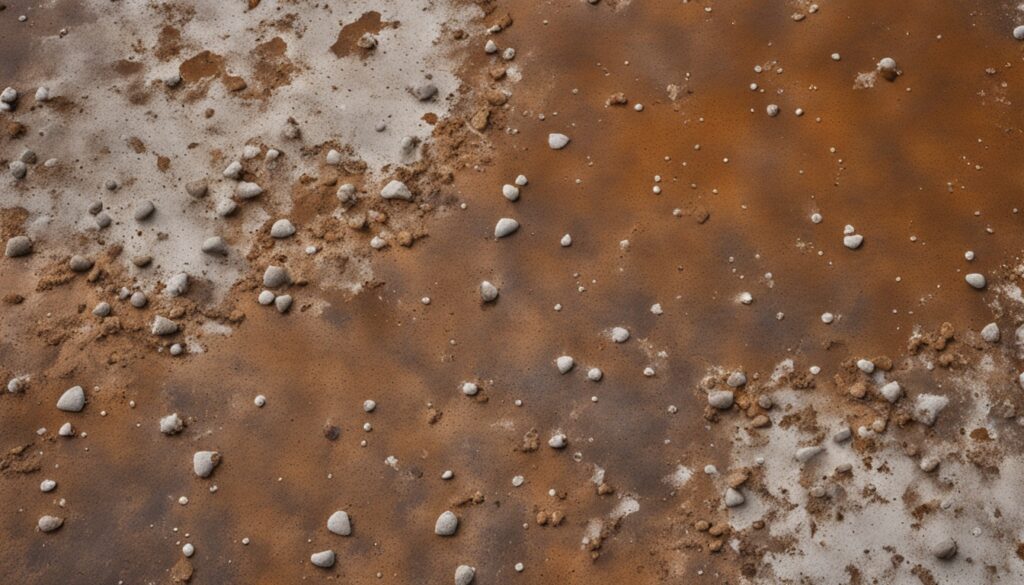Concrete is the most commonly used building material globally. It’s loved for its strong and affordable qualities. Yet, cleaning it regularly is a must to keep it looking good and strong.
For cleaning concrete, there are many types of cleaners and degreasers. Each one is made for different types of stains and dirt. Knowing your options helps you pick the best one for your cleaning job.
Acidic cleaners use acids to clean concrete. They are great for mineral deposits, paint, rust stains, and efflorescence. These are things that can be really hard to get rid of.
Alkaline cleaners use strong bases to clean. They are best for areas with a lot of grease and oil, like busy floors. They can tackle those tough oil stains.
Enzymatic cleaners are designed for things like food stains or pet urine. They break down these organic stains well. They’re a focused choice for specific problems.
Solvent-based degreasers are perfect for tough grease and oil. They’re commonly used in driveways, garages, and factories because of their strength.
Bio-based cleaners provide a green way to clean. They’re not as strong on hard stains, but they’re environmentally friendly. They’re a good choice for those who are eco-conscious.
When choosing a cleaner or degreaser, think about the surface and what you need to clean. Also, consider safety, the environment, cost, and where you can buy it. CC501 is one of the best choices for all kinds of cleaning, from big jobs to small ones at home.
Key Takeaways:
- Concrete is the most widely used building material due to its durability and affordability.
- Regular cleaning is crucial for maintaining the appearance and integrity of concrete surfaces.
- There are different types of cleaners and degreasers for specific cleaning needs.
- Acidic cleaners effectively remove tough mineral deposits, rust stains, and more.
- Alkaline cleaners tackle grease and oil buildup in high-traffic areas.
- Enzymatic cleaners are designed to break down organic stains.
- Solvent-based degreasers are highly effective for heavy grease and oil.
- Bio-based cleaners offer an environmentally friendly option.
- Consider factors such as surface type, stain, safety, and availability when choosing a concrete cleaner.
- CC501 is a recommended cement cleaner for various surfaces and applications.
What Are Concrete Cleaners and Degreasers?
Concrete cleaners and degreasers are important for keeping concrete surfaces clean. They remove dirt, stains, oil, grease, and more. These products help keep concrete surfaces looking good and lasting longer.
They work by breaking down substances stuck on concrete. This makes dirt and stains easier to clean off. There are many types, each designed for different cleaning tasks.
Types of Concrete Cleaners
- pH-neutral cleaners: These cleaners work best on sealed indoor floors but also clean mild stains on unsealed areas. You can find them at stores that sell concrete products, hardware stores, and janitorial shops.
- Acidic cleaners: They remove efflorescence from hard water, high salt, or soil. Muriatic acid, a type of hydrochloric acid, is often used. You can get them at specialty concrete stores.
- Alkaline degreasers: For oil, grease, and tough stains, these are your best bet. They also neutralize the surface after acid cleaning. You’ll find these at concrete shops or online, and you might need to dilute them.
- Enzymatic or bacterial cleaners: These are for specific stains like protein or oil. They need time to work but are strong when it comes to those tough stains.
- Specialty cleaners: Serve unique cleaning needs, like rust or efflorescence. Their performance depends on the situation.
It’s key to choose the right cleaner for the job. Consider the stain, the surface, and what you want to achieve. Always follow the instructions to get the best results without harming the concrete.
Why Use Concrete Cleaners and Degreasers?
Concrete cleaners and degreasers keep concrete clean and lasting longer. They make cleaning easier and more powerful. They help concrete surfaces stay perfect by defending against stains, grease, and oil.
They are great at breaking down hard stains. Concrete can get stains from oil, grease, food, and rust. These stains are tough to clean normally. But, these special cleaners can dissolve them, making removal easy.
These cleaners are made just for concrete. They come in neutral or acid types, depending on the job. Neutral ones are for simple indoor surfaces. You can buy them at many stores. Acids are for tougher jobs and found in specialty stores.
They also help keep the concrete strong. Regular cleaning is important for looks and strength. These cleaners remove things that can wear the concrete. This makes the concrete last longer and look better.
When picking a cleaner, think about the surface and the stain. Also, think about safety, if it’s eco-friendly, the cost, and where to get it. Different cleaners work on specific stains. Green options exist, but they might not be as strong.
In summary, these products are key for concrete care. They remove stains, protect the surface, and make the concrete last. Use them regularly for a clean and well-maintained area.
Types of Concrete Cleaners and Degreasers
Choosing the right cleaner or degreaser is crucial for concrete maintenance. Various options offer specific benefits. Let’s explore the top choices.
1. Acidic Cleaners
When it comes to challenging stains, acidic cleaners excel. They use hydrochloric or phosphoric acid to dissolve mineral buildup, paint, rust, and more. These cleaners are ideal for industrial environments or deeply soiled areas.
2. Alkaline Cleaners
Alkaline cleaners are great for routine concrete care. They break down dirt and grease using substances like sodium or potassium hydroxide. Their use extends to neutralizing concrete after acid cleaning or staining.
3. Enzymatic Cleaners
Designed for organic stains, enzymatic cleaners contain specific enzymes. These enzymes target food, pet urine, and other organic materials without needing water. Enzymatic cleaners are efficient and leave minimal residue.
4. Solvent-Based Degreasers
To tackle tough grease and oil, solvent-based degreasers are the go-to. They work by dissolving grease and oil with powerful solvents. Ideal for heavy grease and oil on concrete.
5. Bio-Based Cleaners
Natural and eco-friendly, bio-based cleaners use ingredients like citrus or soy to clean. They’re kinder to the environment but may struggle with severe stains. Still, they’re a safe and green choice for concrete surfaces.
Choosing the best cleaner or degreaser hinges on several factors. These include the surface type, stain type, and one’s budget and concerns for the environment. Always read and adhere to the manufacturer’s instructions for safe and effective usage.
Regular cleaning with the right products can extend the life of your concrete. It also keeps the area looking good. How often you clean depends on dirt levels and specific needs. Monthly cleaning is good for general upkeep, but dirtier places might need more attention.
While bio-based options are safe for the planet, they might not defeat all stains. For tough spots, consider other types. It’s wise to test any cleaner on a small spot first to check its effects.
The effectiveness of cleaners and degreasers is influenced by the cleaning task and surroundings. Select the most suitable product and ensure proper application for the best outcome.
Methods for Cleaning Concrete Stains with Soap and Scrub
One simple way to clean concrete stains is by using soap and a scrubbing brush. This method works well on many types of stains. You can keep your concrete looking nice with these steps.
First, get what you need:
- Dish soap or liquid detergent
- Warm water
- A stiff-bristled brush
Here’s how to remove the stains:
- Mix a bit of soap or detergent with warm water. About one tablespoon per gallon is good.
- Use the mix to dampen the concrete stain.
- Scrub hard with the brush. Push down to get the stain off well.
- Finally, rinse the area well to remove everything.
This method works for many stains, like dirt, grease, and more. It saves you money and doesn’t require strong chemicals. Cleaning your concrete this way is easy and good for the environment.
Don’t forget safety. Wear gloves and goggles when using strong cleaning stuff. Always test the cleaner on a small spot first to be safe.
By regularly cleaning your concrete, you make it last longer. A clean space is more beautiful and useful. With a bit of effort, you can keep your concrete looking great.
Methods for Cleaning Concrete Stains with Lemon Juice and Kitty Litter
To get rid of tough concrete stains, like paint marks, mix lemon juice and kitty litter. They are gentler on the environment and you’ll find them around the house. These two items make an effective stain removing mix.
Create a paste by mixing the lemon juice and kitty litter. The lemon juice works to break down the stain. Kitty litter’s gritty texture helps scrub the stain off.
Apply the mixture over the stain. Make sure it covers the whole area. Let it sit for a few hours. This gives it time to deeply penetrate the stain.
Next, scrub the area hard with a stiff brush. This action, along with the lemon juice and kitty litter, will loosen the stain. It makes the stain easier to get off.
After scrubbing, rinse the area well. For older or bigger stains, you might need to repeat this process. They might take longer, up to 24 hours, to fully remove.
Don’t use bleach on oil spots. It can harm the concrete. For tough grease marks, like those from grills, turn to lemon juice and kitty litter. They work wonders without the bad side effects.
Using lemon juice and kitty litter for cleaning stains does a great job. It’s also better for the planet. Enjoy great results the eco-friendly way.
Methods for Cleaning Concrete Stains with Food Grease
Oil spots and food grease are often seen on concrete floors. Luckily, you can remove these tough stains. Using the right methods, you can make your concrete look new again.
Cleaning food grease from concrete involves a few proven methods.
Using Kitty Litter
Kitty litter is handy for more than just cats. It’s great for soaking up liquid on concrete from food grease spills. First, pour a lot of kitty litter on the stain. Then, let it sit for several hours or overnight. The litter will soak up the grease, simplifying the clean-up. After that, just sweep or vacuum the litter up. Finally, wash the spot with warm, soapy water.
WD-40
WD-40 does more than fix squeaks. It’s very good at removing oil and grease from concrete. Apply WD-40 by spraying it right on the grease stain. Let it sit for a few minutes. Next, scrub the stain with a brush or sponge and rinse with water. You might have to repeat these steps a few times to fully remove the stain.
Carbonated Beverages
Surprisingly, carbonated drinks can lift oil stains from concrete. Their bubbles and the acid they contain help break down the grease. Pour the drink on the stain and leave it for a bit. Then, scrub and rinse. You may need to do this a few times.
These methods do work for food grease on concrete. But remember, the best way to keep concrete clean is to prevent the stains. Always clean up spills right away. Use mats to stop dirt and wetness from coming inside. Also, seal the concrete after getting rid of stains. These steps will keep your concrete floors looking great.
Methods for Cleaning Concrete Stains with Rust Stains
Rust stains on concrete can be tough to defeat. But, there are good ways to get rid of them. Let’s explore two proven methods for cleaning up those unsightly rust stains.
Using White Vinegar Cleaning Solution
White vinegar is a top-notch cleaner. It’s perfect for busting through rust stains on concrete. Here’s how you can do it:
- Mix white vinegar and water in a spray bottle, using equal parts.
- Apply the mixture on the rusty spots. Let it sit for 7 to 10 minutes to work its magic.
- Scrub the area with a brush after the waiting period. The rust should come off easily.
- After scrubbing, make sure to rinse the surface thoroughly with water.
White vinegar works well on light rust marks. You might need to repeat the process a few times. But, it’s important to remember that white vinegar is strong. It can harm some surfaces. Be cautious where you use it.
Using Muriatic Acid
Muriatic acid is for the really tough rust stains. It’s strong stuff, so use it carefully. This is how you can clean stubborn rust with muriatic acid:
- Follow the directions on the muriatic acid container to dilute it with water. Do this in a ventilated place.
- Put on protective gear like clothes, gloves, and eye protection.
- Spread the acid mix onto the rust stains evenly.
- Wait a few minutes but don’t let it dry out.
- Scrub hard to lift the rust away with a brush or broom.
- Then, rinse the area very well with water to make it safe.
Muriatic acid can harm concrete if not used right. Always test a small area first. And, remember to follow all safety rules.
After using any rust cleaning method, always rinse the concrete well. If the rust won’t go or covers a big area, consider getting help from a pro. They have the tools and knowledge to tackle tough jobs.
Methods for Cleaning Concrete Stains with Bird Droppings
Bird droppings can make concrete look bad and stain it. You need to clean them off fast to stop more harm. This keeps your place looking neat. Here’s how to clean bird droppings off concrete:
- Use liquid dish-washing soap mixed with warm water. Put it on the stain and wait a bit. Then scrub with a hard brush to get rid of the spot.
- Create a mix with 1 tablespoon of 12-percent hydrogen peroxide and three drops of ammonia. Put this on the stain and let it stay a few minutes. Then scrub and rinse with water.
- Pressure washing is good for tough bird dropping stains on concrete. But, it can harm some surfaces. It’s best to get pros to do it. They can remove the stains safely.
Bird droppings have feces and food bits like berries in them. You should remove them as soon as possible. If the stain is hard to get out, call someone who knows cleaning. They have the right tools and knowledge to clean without damage.
Methods for Cleaning Concrete Stains with Pet Stains
Concrete can absorb spills and stains because it’s porous. Removing pet stains, like urine, can be hard from concrete. But, there are ways you can clean pet stains from concrete effectively.
1. Enzymatic Cleaners: Enzymatic cleaners are great for pet stains on concrete. They are made to remove organic matter. These cleaners have enzymes that eat up the organic stuff in concrete. To use, put the cleaner on the stain, wait for the right time, and wash off with water.
2. Baking Soda: Baking soda is a good, natural cleaner. It can get rid of smells and pet stains on concrete. First, spread baking soda on the area. Make sure the spot is fully covered. Then, scrub the stain with a stiff brush and let it sit for 15 minutes. Finally, wash the area well with water.
You might need to try cleaning pet stains more than once, especially if they are deep or old. If the stains are really tough, try using special stain removers. Or, get help from a professional cleaner.
Always be careful when cleaning concrete stains. Wear safety gear like goggles, gloves, and the right clothes. This is very important, especially if you’re using strong cleaners.
With these tips, you can make your concrete surfaces clean again. This helps your place look good and stay healthy.
Methods for Cleaning Concrete Stains with Mud and Foliage
Concrete surfaces can easily get stained by mud and leaves. Luckily, you can remove these kinds of stains and make your concrete look clean again.
A great way to clean is by making a solution of dish soap or laundry detergent with warm water. Pour this mixture on the stain to cover it well. Let it sit for 10 minutes so it can start breaking down the stain.
Next, grab a stiff-bristled brush and start scrubbing hard. Scrubbing helps remove the stain by lifting it off the surface. Remember to scrub in different directions to get it all out.
When you’re done scrubbing, rinse the area with clean water. This washes away the soap and leftover dirt. Use a hose or a pressure washer gently to rinse the area well.
For really stubborn stains, you might have to clean more than once. You could also try stronger cleaning solutions. A pressure washer can also help, but be careful not to damage the concrete.
It’s true that some stains are harder to remove than others. But don’t give up. Keep trying until your concrete looks the way you want it to.
After cleaning, it’s wise to seal the concrete. This helps keep future stains away, making cleaning much simpler later on.
Conclusion
Keeping concrete stains off your floors is key to their shine and life span. Regular cleaning and preventive steps work wonders. Make sure to use sealants and mats. This way, your floors will stay clean and shiny for a long time. Concrete floors are strong, low-cost, and a top pick for many places.
Choosing the right cleaner is crucial based on the stain and your floor’s needs. Harsh chemicals like vinegar and ammonia can hurt the concrete. Go for pH-neutral cleaners safe for all floors.
Getting professional advice on the best cleaner for you is a smart move. The right cleaning method depends on the stain type. For example, grease, mold, or algae might need different solutions. You can try using green options like baking soda with water or vinegar. Or, choose from commercial cleaners made for tough jobs.
For really hard stains, a power washer can get them out quickly. Yet, always think about the environment. Protect nearby plants, grass, and wildlife. This ensures your clean-up doesn’t cause any harm.



